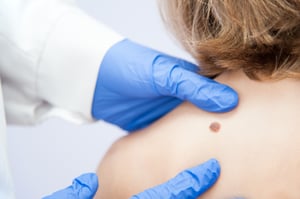 Skin cancer knowledge has come a long way over the years. Tanning bed use is down and sunscreen sales are up. Everything is moving in the right direction, including the education level of patients. Still, even though most people today have heard of the deadliest form of skin cancer, melanoma, fewer are familiar with the two most common forms – basal cell and squamous cell carcinoma. Given that these two types account for about 95 percent of all cases, understanding their characteristics is paramount to preventing skin cancer.
Skin cancer knowledge has come a long way over the years. Tanning bed use is down and sunscreen sales are up. Everything is moving in the right direction, including the education level of patients. Still, even though most people today have heard of the deadliest form of skin cancer, melanoma, fewer are familiar with the two most common forms – basal cell and squamous cell carcinoma. Given that these two types account for about 95 percent of all cases, understanding their characteristics is paramount to preventing skin cancer.
Basal Cell Carcinoma
Basal cell carcinoma (BCC) is the most common form of skin cancer and affects over 2 million people each year. Typically, they will appear in the areas of your body that regularly receive the most sun exposure. This includes the nose, ears, and cheeks. In order to identify a potential BCC, be on the lookout for the following:
- An open sore that frequently bleeds and never completely heals
- A red, irritated patch of skin that may itch
- A translucent bump with a pearl-like appearance
- A pink growth with raised edges and an indented center
Squamous Cell Carcinoma
Following BCCs, squamous cell carcinoma (SCC) is the second most common form of skin cancer, accounting for roughly 20 percent of all new cases. Often, SCCs develop out of pre-cancerous lesions known as actinic keratoses (AKs). In fact, this is the case anywhere from 40 – 60 percent of the time. However, spotting and removing an AK early can prevent the cancer from developing entirely. Here’s what to look for:
- A persistent scaly patch that may crust or bleed
- An elevated lesion with an indented center that may bleed
- An open, bleeding and crusting sore that lasts for weeks
- A growth similar to a wart in appearance that may crust and bleed
Skin Care in Zachary
Lane Dermatology treats all manner of skin conditions and concerns including all forms of skin cancer. Our services also include skin checks to help identify potential signs of skin cancer, as early detection is key. Contact our office to get started with an appointment.



.png?width=850&height=850&name=lane%20badge%20(1).png)


-1.png?width=711&height=711&name=healthy%20br%20(4)-1.png)

